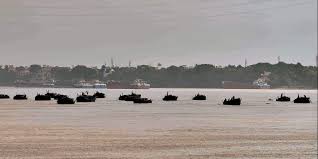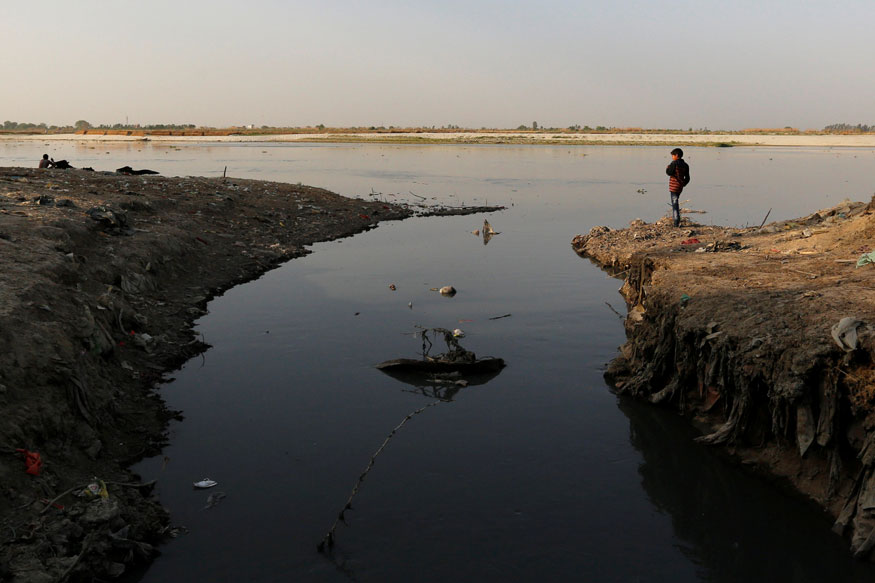Source: newindianexpress.com
NEW DELHI: The Bihar government told the National Green Tribunal on Wednesday that 17 towns along the Ganga river in the state have been declared open-defecation free (ODF).
Five towns are currently in the process of being declared ODF, it said.
In an affidavit filed before NGT Chairperson Justice Adarsh Kumar Goel, the state government said that 17 towns have been declared ODF.
They are: Barh, Hajipur, Sonepur, Mokama, Bakhtiyarpur, Teghra, Maner, Barhiya, Manihari, Buxar, Naugachia, Danapur, Dighwara, Jamalpur, Munger, Begusarai and Bhagalpur It said the work was in process in Patna, Chhapra, Sultanganj, Khagariya and Kahalgaon.
With regard to liquid waste management, the state government informed the tribunal that a total 26 sewerage infrastructure projects sanctioned at a cost of Rs 5,089.82 crore which are at different stages of implementation in various towns — Patna (11 projects), Begusarai, Munger, Hajipur, Mokama, Sultanganj, Naugachia, Barh, Bhagalpur, Sonepur, Chhapra, Khagaria, Bakhtiyarpur, Maner, Danapur and Phulwarishariff.
These projects will facilitate in treatment of 616.5 MLD of sewage through creation/rehabilitation of Sewage Treatment Plants (STPs), sewerage network and allied Interception and diversion works, it said.
The affidavit was filed after NGT’s May 29 order directing Bihar, West Bengal and Jharkhand to monitor Ganga cleaning and file report.
The report said 14 projects are being implemented include Beur STP, Beur Sewerage Network, Saidpur STP & Adjoining Network, Saidpur Sewerage Network, Karmalichak STP, Karmalichak Sewerage Network, Pahari STP, Pahari Zone-IV A (South), Pahari Zone V, Sultanganj, Mokama, Sonepur, Barh and Naugachhiya.
Letter of acceptance has been issued for four projects — Digha, Kankarbagh, Bakhtiyarpur and Maner while seven projects — Hajipur, Bhagalpur, Begusarai, Chhapra, Danapur, Phulwarishariff and Khagaria — are under tendering stages.
Tender for 1 project (Munger) has been floated and a revised estimate of a project in Buxar is under process.
There are 118 ‘Nallas’ in the Ganga towns, of which 111 ‘Nallas’ have been screened and the remaining are in progress, said the report, filed through advocate Balendu Shekhar.
On the issue of plastic ban, it said that 100 per cent single use plastic (Plastic Carry Bags) have been banned in all the urban local bodies in state of Bihar.
“Penalty provisions have been made for involvement in production, distribution, trading, storage, sale of plastic carry bags irrespective of its thickness and sizes in the respective urban local bodies Plastic Waste Management Byelaws, 2018.
A total of 38,283 shops or establishment have been raided and fine for Rs 18,99,495 has been collected and 8,085.21 Kg of plastic carry bags were also seized,” the state government said.
The report said that in the context of Bihar, the polluted stretches are — Ganga, Punpun, Ramrekha, Sikrahana, Sirsa and Parmar.
It also told the tribunal that as per its direction an environmental compensation of Rs 25 lakh has been deposited.
Even a drop of pollution in Ganga is a matter of concern and the attitude of all authorities should be stringent to protect the river, the NGT had earlier said while seeking a concrete action plan on the issue.
The green panel had said people drank and bathed in the river with reverence, without knowing that it may adversely affect their health.

